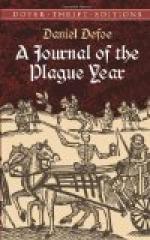Had not this particular of the sick being restrained as above been our case at that time, London would have been the most dreadful place that ever was in the world. There would, for aught I know, have as many people died in the streets as died in their houses: for when the distemper was at its height, it generally made them raving and delirious; and when they were so, they would never be persuaded to keep in their beds but by force; and many who were not tied threw themselves out of windows when they found they could not get leave to go out of their doors.
It was for want of people conversing one with another in this time of calamity, that it was impossible any particular person could come at the knowledge of all the extraordinary cases that occurred in different families; and particularly, I believe it was never known to this day how many people in their deliriums drowned themselves in the Thames, and in the river which runs from the marshes by Hackney, which we generally called Ware River or Hackney River. As to those which were set down in the weekly bill, they were indeed few. Nor could it be known of any of those, whether they drowned themselves by accident or not; but I believe I might reckon up more who, within the compass of my knowledge or observation, really drowned themselves in that year than are put down in the bill of all put together, for many of the bodies were never found who yet were known to be lost; and the like in other methods of self-destruction. There was also one man in or about Whitecross Street burnt himself to death in his bed. Some said it was done by himself, others that it was by the treachery of the nurse that attended him; but that he had the plague upon him, was agreed by all.
It was a merciful disposition of Providence, also, and which I have many times thought of at that time, that no fires, or no considerable ones at least, happened in the city during that year, which, if it had been otherwise, would have been very dreadful; and either the people must have let them alone unquenched, or have come together in great crowds and throngs, unconcerned at the danger of the infection, not concerned at the houses they went into, at the goods they handled, or at the persons or the people they came among. But so it was, that excepting that in Cripplegate Parish, and two or three little eruptions of fires, which were presently extinguished, there was no disaster of that kind happened in the whole year. They told us a story of a house in a place called Swan Alley, passing from Goswell Street near the end of Old Street into St. John Street, that a family was infected there in so terrible a manner that every one of the house died. The last person lay dead on the floor, and, as it is supposed, had laid herself all along to die just before the fire. The fire, it seems, had fallen from its place, being of wood, and had taken hold of the boards and the joists they lay on, and burned as far as just to the body, but had not taken hold of the dead body, though she had little more than her shift on, and had gone out of itself, not hurting the rest of the house, though it was a slight timber house. How true this might be, I do not determine; but the city being to suffer severely the next year by fire, this year it felt very little of that calamity.




